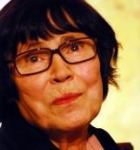The art of Agota Kristof is the greatest example in European literature of making a virtue out of necessity. Her handicaps eventually added up to a full-scope representation of the world.
Source: The art of Agota Kristof (1935-2011) – hlo.hu

Ever since about 1902, the date of the publication of Hofmannsthal’s Lord Chandos Letter, the loss of language, the ineptitude of linguistic expression has been one of the main motifs of European literature. According to the great Austrian writer words have lost their meaning, they crumble in the mouth like mouldy fungi; they float round him; they congeal into eyes which stare at him. The Whole is not felt anymore; everything disintegrates into parts. “Every Whole has shattered, every flame flares up in parts”, the Hungarian poet Endre Ady wrote somewhat later. There is no such thing as a mother tongue anymore; language has stopped to fondle its child, it exists at best as a foster-mother tongue. Language has not died, but it has become an enemy; an obstacle for itself. But the great paradox, perhaps the greatest paradox of literature, is that the checkmate of language can only be expressed in and through language. Hofmannstahl’s essay on the inability of language to express things is at the same time one of the greatest triumphs of the expressivity of German literary language.
If language behaves like a foster parent, narration becomes difficult to the point of being impossible. How to tell stories if we lack the means to tell them? How should the novel speak if every utterance, and thus the featuring of every literary character has become a dubious enterprise? Narration requires a plot, but how can we narrate the fact that there is nothing to narrate anymore? The deepest and most comprehensive answers have come from diverse places and languages: from Proust, Joyce, Musil and Thomas Mann. And it is no accident that the most thorough theoretical assessment of the crisis of the novel, Georg Lukács’s Theory of the Novel was written at around the same time (in 1916). It was then that the novel became a total novel—it was the era of the greatest stylistic revolution of the novel, when it strongly shifted towards the lyrical, when it disintegrated and then rebuilt itself from the ruins, thus functioning as the world poem of the era in a way, like Faust or the Divine Comedy had in their own times.
After 1945, in a Europe which was in ruins in every sense of the word, the novel (and art in general) lost its territory, and it seemed that even reflection, the activity that had kept the novel alive until then has become unviable. The Whole was shattered into ever smaller pieces, and every possible novelistic response seemed and still seems unique and lonesome. Thomas Bernhard, Saramago or Sebald do not lead anywhere except to themselves.
In this aesthetic state of the world Agota Kristof, who was born in Csikvánd, Hungary in 1935 and who died in Neuchâtel, Switzerland on 27 July 2011, found a completely unique answer. For her, the loss of language, the loss of the mother tongue was not a fact of aesthetics or of the philosophy of history, but a fact of everyday life. When she left Hungary, she lost the Hungarian language, and since she did not speak French, she found herself in an impossible situation as a writer (and, of course, as a human being). She became illiterate. Her confession about this is just as simple and shocking as Trilogy, her masterpiece written between 1986 and 1991. “I know that I will never be able to write in French like native French writers, so I write as I can, doing my best. I did not choose this language. Writing in French: I am forced to do that. This is all a challenge to me. A challenge for an illiterate person.”
The art of Agota Kristof is the greatest example in European literature of making a virtue out of necessity. Her handicaps eventually added up to a full-scope representation of the world. Even the most elementary particles of her writing bear witness to the loss of language: she uses the present tense because she cannot (and probably does not want to) handle the complicated French past tenses; she uses the first person plural because she does not want to individualize people, for she does not see individuals anymore, only strange creatures—in the case of Trilogy, a set of twins. The simplicity of Trilogy is on a par with the deepest complexity imaginable. The short sentences, devoid of adjectives, convey the utter barrenness of the world. The bad use of language makes for a more elemental effect than any linguistic ornamentation. This is a unique, inimitable formula. But perhaps the recent history of the novel has proved that the more unique the narration, the more chance there is for creating enduring value. I for one do not have any doubts about the durability of Agota Kristof’s art.
